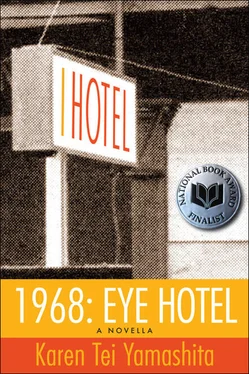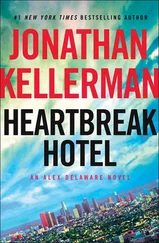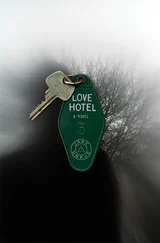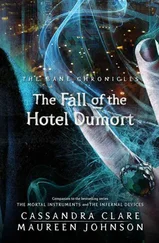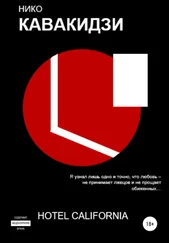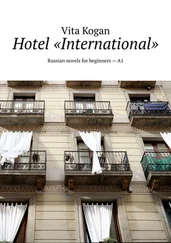ABC: American-Born Chinese
MIT: Made in Taiwan
HIP: Hong Kong Instant Product
FOB: Fresh Off the Boat
KMT: Kuomingtang
ROC: Republic of China (Taiwan)
PRC: People’s Republic of China (mainland China)
MTTT: Mao Tse-tung Thought
O.K., now they’re finished with their history lesson.
Here comes the ABC Red Guard with their flamboyant red flags, blasting “East is Red.” RG struts his thing to the podium and makes his speech: We of the Red Guard salute you in the Year of the People Off the Pig!
(chanting) People Off the Pig! People Off the Pig!
Let it be known today, May 4 in the Year of the People Off the Pig, that we, the Red Guard, claim the territory of Portsmouth Square in the name of The People and henceforth rename it Tiao Yu Tai Park!
China in the News in 1971
July 15
After Secretary of State Henry Kissinger’s secret mission to Peking, President Nixon announces he will visit China.
September
Lin Piao, understood to have been Mao Tse-tung’s successor, is killed in an airplane crash in Mongolia. The official explanation is that he had been involved in a failed plot to kill Mao and was killed fleeing to the Soviet Union.
October 25
Resolution 2758 is passed by the General Assembly of the United Nations, withdrawing recognition of the ROC as the legitimate government of China, and recognizing the PRC as the sole legitimate government of China.
But, darling, as I was saying about the movies: I’m sitting next to Edmund in the dark with those millions of black-and-white Chinese flickering off our faces, and they say: THE CHINESE PEOPLE HAVE STOOD UP! And Edmund, he’s wiping his tears away. O.K., I admit it: I cried too. I cried, and I’m not really Chinese. When it comes to solidarity, I’m solidarity all the way.
So right now, Edmund and his comrades are marching over to the Taiwan—or was it the Formosa?—Consulate to deliver their manifesto. Oh excuse me. The Republic of China Consulate. Listen, if you ask Edmund, he’ll tell you that this is not an issue of supporting one government or another. It’s not about long live Chiang or Mao. This is about the sovereignty of the Chinese people, period. You and I could be there now with the masses, yelling. The Chinese people have stood up! The Chinese people have stood up! Oh, rub me there, baby. Right there. It’s time now, baby. Oh yes. The Chinese people have stood up! The Chinese people have stood up! THE CHINESE PEOPLE HAVE STOOD UP!
When we arrived, there was no Golden Gate, no Statue of Liberty. Even so, some shouted: America! America! And we floated into the bay like the fog at twilight. If we got here earlier than the great earthquake and fire, our first impressions of our golden city were on the Barbary Coast—loose men and women of the vintage Gay Nineties carousing in dance halls and bars, around and about in horse-drawn buggies, speculating on a future and fortunes made from California gold. If we arrived after the fires, some of us might have noticed the island of Alcatraz but were forced to dock at another prison island, the one called Angel.
In those early years, the bay’s geography was traversed by ferries, fanning out from the city’s great transportation hub: the Ferry Building. We ourselves fanned out across the peninsulas, congregating in cities segregated by covenants, in farmlands confined by land laws and leasing contracts, on coastal waters in small fishing boats. We worked as houseboys, cooks, pickers and stoop labor, gardeners, fishermen, and canners. We opened shops: groceries, dry goods, tailoring, restaurants, flower shops, drug stores with soda fountains. We ran boarding houses and hotels, churches, temples, newspapers, health clinics, language schools, YMCAs and YWCAs, and kenjinkais. We gave our adopted towns names like Li’l Yokohama and Nihonmachi.
By the third decade of the century, our children witnessed the great engineering feats and the openings of the stately Golden Gate and Bay bridges. Cable cars and automobiles replaced horses and ferryboats. We sent our children to school and college, only to see them return home jobless. Those were the days when you’d meet a fella with an engineering degree selling fruit on the corner. Everything changed with the bombing of Pearl Harbor. We were forced to leave our li’l towns and farming and fishing communities and were herded en mass to desert camps surrounded by barbed wire and gun towers. We looked like the enemy, but that’s not the same as being the enemy.
At war’s end, those of us who survived came back to our golden city and our little towns, took up our old jobs or started new ones. We rebuilt our old communities and started new families. Our youngsters turned into the third generation, what we call the sansei, and that’s about the time when this story begins.
Who’s to say what love is or how it starts inside each person? Who’s to say what triggers the feeling, the knowing that passes from one to the other? We saw the young man walk through the tattered remains of the old ferry building. Maybe it was the old building with its ghost lovers, we can’t say. We could see his footfalls avoid the scraps of trash ground into grimy crevices. Maybe it was the decay of an old place. He was wearing gold alligator cowboy boots. We could see them shuffling out from his ragged bells, scuffed and shredding at the toe. We could tell that those boots were his favorite, snug in the right places, his walk confident.
He walked out into the warm-swept sunlight, the sort of day we rarely know in our foggy city. When such a day arrives, it’s like a sweet summer gift, and we know that we truly live in the most beautiful city in the world. From the hills we can see the glorious expanse of the azure bay and its bridges reaching into the picturesque vistas. All the pastel Victorians winding up and down over the hills in rows, like glittering ladies with gloved hands pressed one to the other.
We saw him remove his jeans jacket and toss it jauntily over his shoulder. Beneath the jacket he was wearing a thin shirt, so thin it was threadbare. It was sepia in tone, and perhaps it was silk or some sort of nylon imitation. We could see it flutter at the sleeves but press with the wind about his body, exposing the curve along his spine and the rise in his chest above his ribcage. The sepia of the shirt reflected off his felt fedora of the same faded sepia, which he adjusted to account for the sun.
He presented his ticket and walked the gangway into the ferry. He chose a place along the starboard railing, looking out across the bay in search of his destination. His soft features shimmered off the glinting ocean.
We weren’t tourists. We lived here, but taking the ferry in those days had become unusual, like the weather on this particular day. A few of us worked on the other side, and the ferry was still the most direct way to some points. But that day, we wanted to revisit old haunts that held our memories. We’d step onto Angel Island and remember our lives as we began our American journey with detention and interrogation.
Chen was already on the ferry, seated on the top deck in his usual spot, reading a book. We knew him to be a regular on this ferry when the weather was good. Maybe our commotion bothered his reading, but when he looked up he watched the young man in his gold boots saunter across the ferry. We smiled at the man’s show of casual independence, and so did Chen. The felt fedora shaded his face with a slight attitude of mystery. In that moment we sensed a longing pass from the young man, flittering like the gulls along the ferry’s wake. We knew that the young man knew he was being watched by the older man. He felt that watching. Craved it. Please see me , his longing seemed to speak.
Читать дальше
